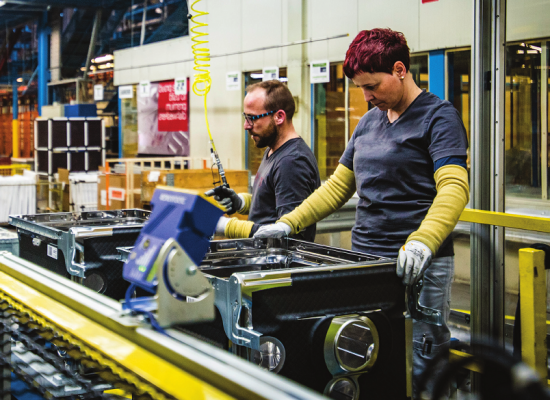Industrial Machinery and Equipment Manufacturer Workers' Compensation Insurance
Workers’ compensation insurance covers workrelated injuries, illnesses, and fatalities by providing ongoing reimbursement, including replacement income and medical costs for injured employees. In the U.S, it is estimated that 15,600 worker injuries occur daily. Workplace illnesses and injuries cost the U.S. an estimated $250 billion annually. These numbers indicate the need for Industrial Machinery and Equipment Manufacturers to acquire Workers’ Compensation Insurance.

Why Workers Compensation Insurance
For most states, workers’ compensation is a legal requirement with problematic consequences if not adhered to. Industrial Machinery and equipment manufacturing has an increased risk of injury due to the employees working with heavy machinery and parts that require moving or assembling.
These activities can cause severe injuries or fatalities to employees. For this reason, employers should ensure that they have workers’ compensation insurance.
Common Injuries Experienced by Employees
Employees who work with heavy parts and often dangerous equipment will encounter hazards that can lead to injury. Injuries tend to be higher in severity in heavy equipment manufacturing than in other industries. Some common injuries for employees in the Industrial Machinery and Equipment Manufacturing industry include trips, slips and falls, repetitive motion injuries, cuts, burns, and amputations. They also include those sustained operating heavy machinery or crushing by dropping heavy items on a body part.
The Consequences of Not Having Workers' Compensation Insurance
Workers’ compensation is a requirement of doing business in most states. Therefore, failure to provide workers’ compensation is a criminal offense. In some states, it is a misdemeanor punishable by either a fine of not less than $10,000 or imprisonment in the county jail for up to one year or both.
In addition to the legal implications, industrial machinery and equipment manufacturers may also be held responsible for all medical costs incurred by an injured worker. This worker can file a civil lawsuit for damages, potentially leading to an employer losing their business, assets, or properties.
Workers' Compensation Limit Requirements
The limits on a workers’ compensation insurance policy include employee benefits and employer liability.
Employee Benefits
The Employee Benefits portion of the policy covers medical expenses, rehabilitation expenses, and lost wages due to being unable to work. It also pays out death benefits to the employee’s dependents. Employee benefits do not usually have limits or exclusions. The insurance carrier will pay out the claim to cover any medical bills necessary to treat the employee’s injury, illness, or rehabilitation. Additionally, claims cannot be declined or denied unless the employer presents proof of fraud. The state’s governing body may set a limit on amounts paid out for lost wages.
Employers Liability
This section of the policy addresses the employer’s liability in the case of a lawsuit. If the employee claims the employer was negligent, they might choose to sue the employer for damages in addition to receiving workers’ compensation benefits. Employers Liability would cover the employer’s legal defense and any monies awarded to the employee. This portion of the policy has limits or the maximum amount the policy will pay out and is determined by the employer when purchasing insurance.
The Benefits of A Workers' Compensation Policy
Workers’ compensation has several vital features designed to protect both workers and employers. Most employees of heavy industrial equipment manufacturers are earning wages that result in their indemnity benefits either near or at the maximum level for their state. A few vital services include coverage for workrelated injuries, illnesses, and deaths.
Workers’ compensation also pays a portion of an employee’s wages during recovery or long-term if the worker cannot return to work. In exchange for these benefits, the employee is prohibited from suing the employer for their injuries. It also covers your business from wrongful death lawsuits by survivors of an employee killed on the job.
The Common Workers' Compensation Class Codes Used
A class code is assigned by the National Council of Compensation Insurance (NCCI) or by state agencies based on the activities of the occupation.
There are many different workers’ comp class codes within the industrial equipment manufacturer segment. Below are the common class codes used:
Code 3507: Machinery Mfg. NOC
Code 3629: Machined Parts Mfg. NOC
Code 3629: Automated Machine Shop NOC
Code 8107: Machinery Dealer NOC
Code 8107: Industrial Engine Sales and Repair & Drivers
The Cost of A Workers' Compensation Policy
The cost of workers’ compensation coverage is above average as both the frequency and severity of claims are greater for industrial equipment manufacturers than for manufacturers of smaller products.
The amount paid by workers’ compensation is a specific rate based on every $100 of your business’s payroll. The premium is determined by your employees’ type of work (classification rate), your experience modification rate or claims history, and your payroll per $100.
Because it is required for all employers, each state has specific business classifications to determine your workers’ compensation policy premium rate since some jobs are more hazardous than others. Your insurance provider can determine a particular rate.
UnderWrite Insurance Services is a national insurance agency that provides A-rated workers’ compensation insurance to cover industrial equipment manufacturer employees. For a free insurance quote, submit an application below or give us a call at 201-580-6806.





